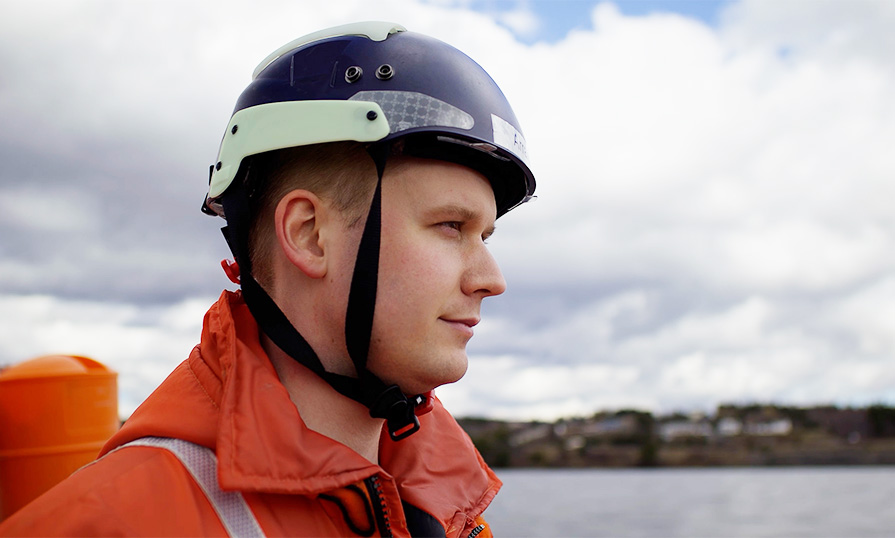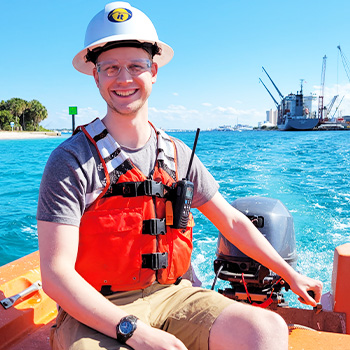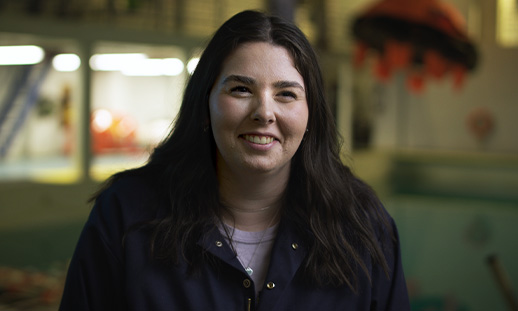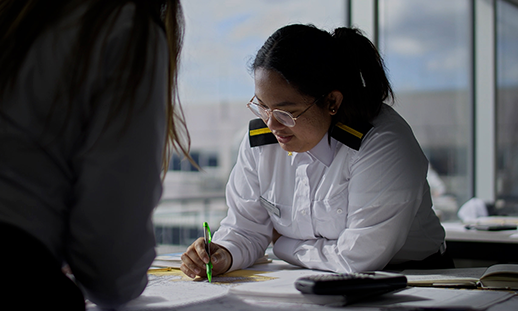Guiding the next generation of seafarers

Get to know Captain Arran Shepherd – marine instructor
Name: Captain Arran Shepherd
Campus: Nautical Institute, NSCC Strait Area Campus
Growing up in Pictou, Nova Scotia, Arran’s fascination with life at sea began when Coast Guard vessels would dock in the local port. A few tours aboard sparked a lifelong curiosity that led him to pursue Marine Navigation Technology - a clear path toward a rewarding career at sea. Now an instructor at NSCC’s Nautical Institute, Arran reflects on how hands-on training laid the foundation for success, and how every vessel and every voyage offers a new opportunity to learn and grow in the marine industry.
Read on to learn more about Arran’s journey from cadet to captain, the scope of training that is offered at NSCC Nautical Institute and his advice for prospective students.
Q&A with Arran
What was your career path from cadet to captain?
For me, it was a 6-year journey from cadet to captain, which is definitely faster than most. I’ll be the first to admit that luck played a part.
After graduating, I was hired into a deck role and from there, I moved up through the ranks. There were times when others weren’t able to return to work, and those situations created opportunities for someone else to step in. Because I had my certifications, was prepared and happened to be in the right place at the right time, I was able to step up and take on the responsibility when it was needed. It was a mix of preparation, timing and being ready when the opportunity came.
What is most appealing about life at sea?
What’s most appealing about life at sea is the sense of adventure and constant change. Every day brings something new - different places, fresh challenges and memorable experiences. You explore new ports, meet people from around the world and form deep bonds with your crewmates - they become your second family.

What skills make a great seafarer?
To be a successful seafarer, I believe it comes down to ambition, dedication and teamwork. The ones who stand out are those who show up early, take pride in seeing a job through to the end and genuinely want to share in that success with the people around them.
Tell us about the scope of emergency training that’s offered at NSCC Nautical Institute?
NSCC Nautical Institute offers a wide range of Marine Emergency Duties (MED) training, from 1-day sessions to intensive 6-day courses. These programs prepare students to respond to emergencies at sea, including fire response, ship abandonment and first aid. Training is hands-on and designed to help students think critically, remember vital details and react effectively in high-pressure situations.
Cadets return for emergency training throughout their program - starting with a basic safety course in year 1, followed by lifeboat training in year 2 and advanced firefighting in year 3. With each stage, students take on more responsibility, eventually leading emergency drills while instructors challenge them with real-life scenarios. The Institute is equipped with specialized simulators for firefighting, lifeboats, navigation, engine rooms and radio operations to create a realistic and immersive learning environment.
What do you love most about being at sea?
What I love most about being at sea are the moments of natural beauty you just can’t find on land. Sailing through the Aleutian Islands surrounded by wildlife and calm seas was unforgettable. Starting the day on the bridge with a coffee while taking in the view - it’s something special. And at night, the sky is filled with stars. Those moments make it all worthwhile.

What advice do you have for prospective students?
My advice to students considering a career at sea is to embrace both the adventure and the chaos that can come with it. Not every day is exciting, and that’s okay. The quiet days give you a chance to breathe, and the chaotic ones - those are the days you learn the most. It’s all part of the journey.
A career at sea can be intimidating at times. It's important to really know what you're doing before stepping into senior roles. Count on the experience of others around you and use every opportunity to learn something new no matter what stage of your career you are in. Take the time to learn, grow and prepare yourself. It is a close-knit industry; a good reputation and ambition for constant improvement will build you a successful and sustainable career at sea.
A'paqt funding for women and Indigenous Peoples
To help meet the marine industry demand and diversify the workforce, the federal government provides funding through the Ocean Dream Award for women and Indigenous Peoples who are enrolled in a marine program. Those eligible may qualify to have 90% of program costs covered by a bursary.
Related Stories
 From whale watching to bridge watch
From whale watching to bridge watch
Hannah is a fifth-generation seafarer whose childhood was filled with fishing, exploring the coast and joining her grandparents’ whale-watching tours. Drawn to the sea’s unpredictable beauty, she’s now pursuing a marine career through NSCC’s Bridge Watch Rating program.
 Charting the course
Charting the course
With no previous experience at sea, Michaela was nervous to join NSCC’s Marine Navigation Technology program—but with hands-on learning and supportive instructors, she’s charting the course to a new world she loves.
